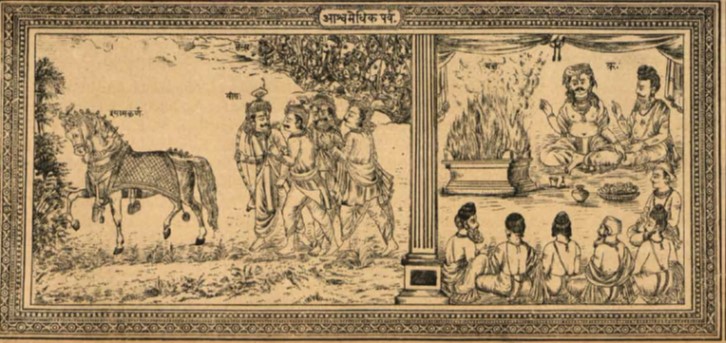The Ashvamedhika Parva, or the Book of Horse Sacrifice, is the 14th book of the 18 books of Mahabharata. It consists of 2 sub parvas and almost 92 chapters. It is based on the famous horse sacrifice ceremony performed by Yudhishthira. It contains almost 4000 verses. The two sub-parvas are Aswamedhika Parva and Anugita Parva. The detailed summary of the sub-parvas are:
Aswamedhika Parva
This Parva consists of 56 chapters and is the longer of the two parvas of Ashvamedhika Parva. Dhritarashtra consoled the lamenting Yudhishthira and the other Pandava brothers. He said that Yudhishthira had no reason to lament as he had successfully gained victory over the ill intentions of Duryodhana. Dhritarashtra said that he himself should be the only one lamenting, as he did not pay heed to the advice of Vidura, who foresaw the destruction of the Kaurava clan due to the arrogance of Duryodhana. Vidura had even advised Dhritarashtra to kill his son Duryodhana to avoid the destruction of the entire clan. He regretted that he gave no importance to Vidura’s words of wisdom then as he lost all his hundred sons. Then, even Krishna consoled Yudhishthira and reminded him of the words of advice given to him by Bhishma, Narada, Vyasa and the other sages. Then, after being convinced by Krishna and other sages, he finished the funeral of Bhishma and returned to Hastinapura along with Dhritarashtra. Towards the end of the Parva, Yudhishthira proved to be a decisive and virtuous king. When Lord Krishna’s objective of staying at Hastinapura, he decided to return to Dwarka. None of the Pandava brothers wanted Krishna to leave, but they respected his opinion of going back to Dwarka.
Anugita Parva
This Parva consists of 36 chapters and is often considered as the second version of the Bhagvad Gita. When Krishna decided to leave for Dwarka, Arjuna asked Lord Krishna to recite him the verses and teachings of Bhagvad Gita again as he had forgotten about its details during the course of the heated war fights of 18 days. Krishna did not want to repeat the same instructions and therefore he decided to narrate the virtues in Bhagvad Gita in a different manner. He named those verses as Anugita and also taught Arjuna to increase his concentration and listening skills. He narrated the conversation of Siddha, Kaashyapa and Maharishi to explain the origin of the human soul, the reasons for human existence, the deeds of Dharma and the ways to rise above the worldly pleasures and matters. He then stressed on the importance of knowledge through the conversation between a Brahmin and his wife. That conversation is popularly known as Brahmana Gita. He then narrated the conversation of the five winds of life, such as the Apaana, the Praana and the others. He went to explain the destruction of the Kshatriya clan by Parasurama and the Dhyana Yoga of the sage named Alarka. Then Lord Krishna taught Arjuna about the principle of Salvation and the principles of brilliance and passion. He further instructed Arjuna the duties of the four ashramas, that is, Gaarhasthya, Brahmacharya, Sanyaasa and Vanaprastha. He concluded the Anugita by stressing on the strength that lies in supreme knowledge.
Lord Krishna and Sage Vyasa advised Yudhishthira to perform the sacrifice called Ashvamedhika as the impact of the war had affected the wealth of the kingdom gravely. The kingdom lacked in wealth and the Ashvamedhika would help rejuvenate the wealth and bring back the kingdom to a path of prosperity. Yudhishthira decided to follow the orders of Krishna and went to the Himalayas to collect gold and wealth. With penance to Lord Shiva, he successfully found wealth by digging the treasure.
Then, Lord Krishna came back to Hastinapura to participate in the Ashvamedhika. The sacrifice started and Arjuna was appointed for the protection of the sacrificial horse, while Bhima and Nakula were appointed to take care of the kingdom and Sahadeva was given the responsibility of taking care of the family. Arjuna along with his army followed the sacrificial horse and also defeated the Trigartas army after engaging in a fierce battle with them. Arjuna also fought in Manipur with Babruvaahana. With all these efforts of Arjuna, the horse sacrifice of King Yudhishthira was successfully completed. When Ashvamedha sacrifice was performed, King Yudhishthira asked Lord Krishna t explained the principles of the Vasihnavas. Lord Krishna explained the principles in the most excellent and poetic manner that won the hearts of all present at the ceremony. Then, the ceremony was complete and all the sages went back to their places and Lord Krishna returned back to Dwarka.

18 Parvas of Mahabharata
1. Adi Parva (the Beginning)
2. Sabha Parva (the Assembly Hall)
3. Vana Parva also Aranyaka-parva, Aranya-parva (the Forest)
4. Virata Parva (Virata)
5. Udyoga Parva (the Effort)
6. Bhishma Parva (Bhishma)
7. Drona Parva (Drona)
8. Karna Parva (Karna)
9. Shalya Parva (Shalya)
10. Sauptika Parva (the Sleeping Warriors)
11. Stri Parva (the Women)
12. Shanti Parva (Peace)
13. Anushasana Parva (the Instructions)
14. Ashvamedhika Parva (the Horse Sacrifice)
15. Ashramavasika Parva (the Hermitage)
16. Mausala Parva (the Clubs)
17. Mahaprasthanika Parva (the Great Journey)
18. Svargarohana Parva (the Ascent to Heaven)






